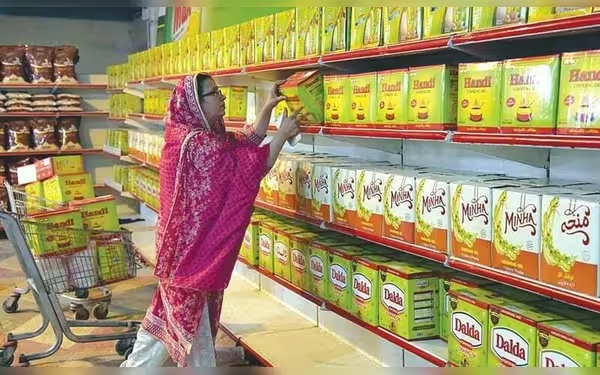Tuesday, December 3, 2024 04:44 PM
PVMA Urges Government to Formulate Edible Oil Policy for Pakistan
- PVMA calls for urgent edible oil policy implementation.
- Pakistan imports 90% of its edible oil, risking food security.
- Chairman warns of rising prices due to Indonesia's legislation.
 Image Credits: dawn
Image Credits: dawnPVMA urges the government to implement an edible oil policy to boost local production and reduce import dependency in Pakistan.
KARACHI: The Pakistan Vanaspati Manufacturers Association (PVMA) is raising an urgent call for the government to implement a comprehensive edible oil policy. This initiative aims to boost local production and significantly reduce the country’s heavy reliance on imports. Currently, Pakistan imports a staggering 90 percent of its edible oil, making it the third-largest palm oil importer in the world. In contrast, domestic production only meets 10 percent of the total demand.
Sheikh Umer Rehan, the chairman of PVMA, has expressed deep concern over recent developments in Indonesia, the world’s largest producer of palm oil. New legislation in Indonesia requires that 40 percent of palm oil be redirected for biodiesel production. This change has disrupted global supplies, leading to increased prices and creating significant challenges for countries like Pakistan that depend heavily on imports.
Mr. Rehan warned, "The reduction in global supply and rising prices, particularly from Indonesia, pose significant risks to Pakistan’s edible oil industry." He emphasized that without proactive measures, these challenges could severely impact local industries and lead to shortages of edible oil in the market.
In light of these pressing issues, the PVMA chairman has called on Prime Minister Shehbaz Sharif and Minister for Commerce Jam Kamal Khan to prioritize the development of a robust edible oil policy. He highlighted the importance of this issue for food security in Pakistan. Furthermore, he suggested that Pakistan should leverage its position as a major importer to influence global pricing. This could be a strategic move to ensure that local production is incentivized and that investments in the edible oil sector are encouraged.
The call for a comprehensive edible oil policy is not just about boosting local production; it is about securing the future of food supply in Pakistan. As the country grapples with the challenges posed by global market fluctuations, it is imperative for the government to take decisive action. By fostering local production and reducing dependency on imports, Pakistan can not only stabilize its edible oil market but also enhance its overall food security. The time for action is now, and the stakes are high for both consumers and producers alike.













